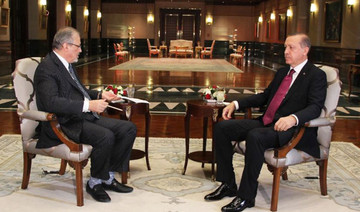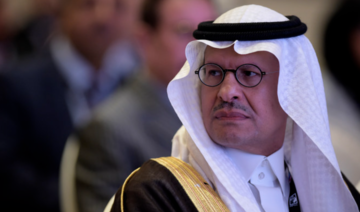RIYADH: Turkey is seeking more cooperation with Saudi Arabia and other countries as it plans to be an energy hub to Europe, its finance minister said.
“Turkey from its geographical position is an energy corridor from Russia, Iran, and Saudi Arabia. Any kind of natural gas or oil that is going to be transported or shipped, will cost less and will be more safely shipped,” Nureddin Nebati told Arab News in an interview.
Speaking on the sideline of the 6th edition of Future Investment Initiative forum in Riyadh, the minister didn’t elaborate further on how the two countries might cooperate but said that peace in the region will bring energy costs down.
“Turkey and Saudi Arabia are also assisting each other, which will bring peace in the region. That peace will bring more affordable gas prices, the energy prices, and will allow both countries to look ahead,” he added.
Saudi Arabia is the largest exporter of oil in the world. Its gas reserves amounts to nearly 300 trillion cubic feet, making it the largest fifth gas reserve in the world. However, the Kingdom doesn’t export gas and it intends to expand production to meet local demand and eliminate the use of oil and other liquids in power generation.

Saudi Commerce Minister Majed Al-Qasabi has estimated Saudi investments in Turkey to total $18 billion, and he expects to see around $3-5 billion in new investments over the coming period. (Reuters)
Nebati’s comments come a week after Turkish President Recep Tayyip Erdogan said that he had agreed with his Russian counterpart Vladimir Putin to form a natural gas hub in Turkey.
Speaking to members of his AK Party in parliament on October 19, Erdogan said Putin had said Europe can obtain its gas supply from the hub in Turkey.
“When we look at Europe, they are dependent on Russian gas, and they will be passing winter with huge stress. This is obvious, and new steps and new structuring need to be taken,” Nebati added.
“And this is why our President Erdogan said that Turkey, which will become a hub, should take the needed measures for the distribution of Iran gas or Russian gas to Europe. And that will contribute to the establishment of peace in the region and create an environment that is safe for this shipment,” he added.
Nebati, who held several meetings with Saudi officials during his visit including the finance and commerce ministers, said that the moves taken by Turkey will help reduce the cost of energy by lowering the cost of transportation.
“That will lead to the solution of the high prices, which is putting the world in front of recession. And in that sense, it is good to interpret that as Turkey being ready to take all the responsibilities as our president said to take a step in comforting the entire world especially Europe in this gas challenge,” he said.
HIGHLIGHT
Nebati, who held several meetings with Saudi officials during his visit including the finance and commerce ministers, said that the moves taken by Turkey will help reduce the cost of energy by lowering the cost of transportation.
Saudi Arabia is also increasing its oil exports to Europe, said the country’s energy minister, Prince Abdulaziz bin Salman, during the same event in Riyadh. He said shipments in September almost doubled from a month ago, reaching 950,000 barrels a day.
The Turkish finance minister said that his country has a production strategy for natural gas.
“As you know, in the Black Sea, we have found natural gas and we have an important reserve. In the incoming months, we will start using that natural gas,” he said.
Saudi-Turkish cooperation
Nebati said that his country is trying to expand economic cooperation with Saudi Arabia which will benefit the region.
“In the incoming period, the cooperation between Saudi Arabia and Turkey will trigger, of course, new cooperation areas and with the vision of Saudi Arabia and Turkey’s 2023 vision, we will step out to a new century and will contribute to bringing peace and prosperity in the region,” he added.
He added that Turkey is supporting the Kingdom’s bid to host 2030 Expo and the two countries are standing together against terrorism.
Speaking to TRT channel last week, Saudi Minister of Commerce Majed Al-Qasabi said that he estimated Saudi investments in Turkey to total $18 billion, and he expects to see around $3-5 billion in new investments over the coming period.
Nebati said that the recent exchange of visits by the Turkish President and the Saudi Crown Prince Mohammed bin Salman “will be beneficial for both parties” and as a result investments, business relations, and trade volume in both directions will increase.
Turkish economic growth
The Turkish economy grew by 7.6 percent on an annual basis in the second quarter of 2022, resulting in 7.5 percent GDP growth in the first half of the year. Last year the economy grew by 11.8 percent, according to official numbers.
“When you look at this growth, it happened thanks to domestic trade, foreign trade and balanced growth. It shows the internal potential of a younger population’s appetite and being a hub of production and manufacturing,”
Nebati explained. The Turkish economy model is based on investment, productivity, and employment, and in the incoming period with the decrease of the commodity prices, and energy prices, “that will contribute to establishing the balance in the current deficit, and that will allow Turkey to solve all the challenges that we lived through since last year,” he added.
Turkish economic growth was supported by huge investments in infrastructure in the last two decades, he said.
Turkey and Saudi Arabia are also assisting each other, which will bring peace in the region.
That peace will bring more affordable gas prices,the energy prices, and will allow both countries to look ahead.
“We have completed huge infrastructures such as railways, highways, airports, and maritime ports. We have completed all of our infrastructures, including investments in hospitals, and education — starting from the primary schools to the universities.”
Localization level in the Turkish economy is high, reaching 80 percent in the defense industry, where it was in the past around 20 percent, he added.
Turkish inflation
Nebati expects this growth to continue but admits that rising inflation and foreign exchange fluctuations remain a challenge.
He said that inflation in Turkey rose because the commodity prices starting from last year increased along with the shipping costs, transport costs, and energy prices.
“But in combating the inflation, we focused on human beings. We wanted to grow. We don’t want people to lose their jobs as we are continuing our manufacturing and productivity.”
“We are not pushing hard on the brake and we want to solve this issue slowly, and we’re lucky because the pressure on energy prices is decreasing,” he added.
“We do not perceive inflation like worldwide. We see it in a human-based approach. We don’t want people to lose their jobs. And we will deploy our efforts so that they don’t lose their jobs.”
Nebati expects inflation to slow down starting from December, and for next year, “we’ll be having the targeted level of 25 percent of inflation. And as I’ve said, we are acting decisively in order to solve that.”
Agricultural products prices went down, and the effect of inflation “due to the foreign exchange attacks of last year also slowed down,” he added.























